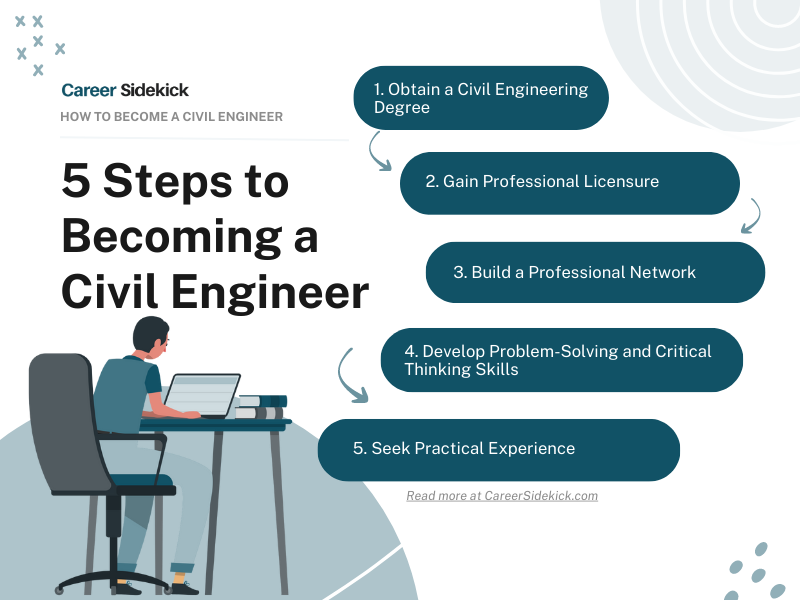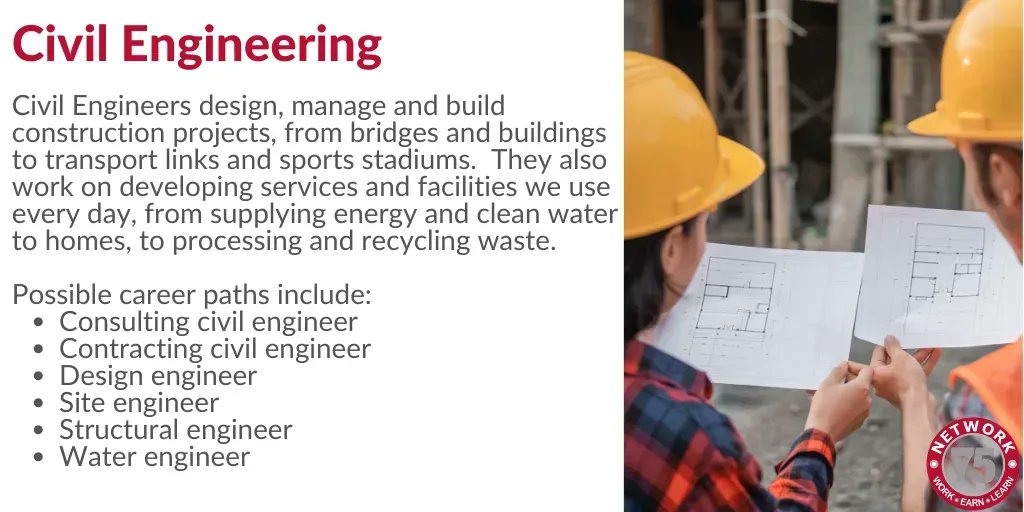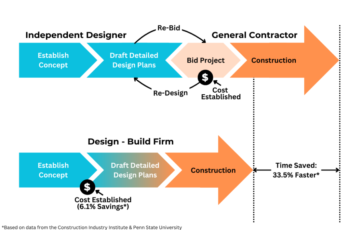How to Become a Civil Engineer: Civil engineers typically need a bachelor’s degree in civil engineering or a related field. Although licensure requirements vary by state, civil engineers usually must be licensed if they provide services directly to the public.
Introduction
Civil engineering is a dynamic and rewarding field that plays a crucial role in shaping the infrastructure of societies. From designing bridges and buildings to developing transportation systems and water resources, civil engineers are at the forefront of innovation and sustainability. This guide provides an in-depth look at the steps required to become a civil engineer, the skills needed, and the potential career paths available in this exciting field.

Chapter 1: Understanding Civil Engineering
1.1 Definition and Scope
Civil engineering is one of the oldest branches of engineering, focusing on the design, construction, and maintenance of the physical and naturally built environment. The field encompasses a diverse range of projects including roads, bridges, dams, airports, and sewage systems.
1.2 Specializations in Civil Engineering
Civil engineering offers various specializations such as structural engineering, environmental engineering, transportation engineering, geotechnical engineering, and water resources engineering. Each specialization focuses on specific aspects of infrastructure development and requires unique skills and knowledge.
Chapter 2: Educational Pathway
2.1 High School Preparation
Aspiring civil engineers should focus on excelling in subjects like mathematics, physics, chemistry, and computer science. Participating in science clubs, attending engineering workshops, and seeking internships in engineering firms can provide valuable early exposure to the field.
2.2 Undergraduate Degree
Earning a bachelor’s degree in civil engineering is the foundational step. Accredited programs typically last four years and cover essential topics such as fluid mechanics, structural analysis, material science, and project management. Students often engage in laboratory work, field studies, and design projects.
2.3 Postgraduate Education
While a bachelor’s degree is sufficient for entry-level positions, a master’s degree or Ph.D. can open doors to advanced roles in research, teaching, or specialized fields. Graduate programs allow students to delve deeper into specific areas, conduct independent research, and develop a professional network.
Chapter 3: Licensing and Certification
3.1 Fundamentals of Engineering (FE) Exam
After earning a bachelor’s degree, graduates should take the FE exam, which is the first step toward becoming a licensed Professional Engineer (PE). Passing this exam designates the individual as an Engineer in Training (EIT).
3.2 Professional Engineering (PE) License
After gaining work experience, typically four years under a licensed PE’s supervision, EITs can take the PE exam. Passing this exam allows engineers to become licensed PEs, which is essential for career advancement and greater responsibility in project management.
3.3 Additional Certifications
Civil engineers may pursue additional certifications in specific fields, such as Certified Construction Manager (CCM) or Project Management Professional (PMP), to enhance their expertise and career prospects.
Chapter 4: Essential Skills for Civil Engineers
4.1 Technical Skills
Civil engineers must possess strong technical skills, including proficiency in computer-aided design (CAD) software, engineering analysis tools, and project management software. Understanding construction methods and materials is also crucial.
4.2 Analytical and Problem-Solving Skills
Engineers must analyze complex data and develop innovative solutions to engineering challenges. Critical thinking and the ability to evaluate risks and benefits are essential to successful project outcomes.
4.3 Communication and Teamwork
Effective communication with clients, contractors, and team members is vital. Engineers should be able to convey technical information clearly and foster collaboration among diverse teams.
Chapter 5: Career Opportunities and Advancement
5.1 Entry-Level Positions
Graduates can start as junior engineers, design assistants, or project coordinators. These roles involve assisting with project planning, conducting research, and supporting senior engineers in design and analysis.
5.2 Mid-Level and Senior Positions
With experience, engineers can advance to roles such as project manager, senior engineer, or department head. These positions involve greater responsibility in project oversight, client interaction, and strategic planning.
5.3 Specialized Roles and Consulting
Experienced engineers might specialize further or transition into consulting roles, providing expert advice and solutions to complex engineering problems for various clients.
5.4 Academia and Research
For those interested in teaching and research, pursuing an academic career is an option. This path involves conducting research, publishing papers, and mentoring future engineers.
Chapter 6: Emerging Trends and Future of Civil Engineering
6.1 Sustainable and Green Engineering
As environmental concerns grow, civil engineers are increasingly focusing on sustainable practices, green building materials, and renewable energy integration in their projects.
6.2 Smart Infrastructure and Technology
The rise of smart cities and advanced technologies like AI and IoT is revolutionizing infrastructure design and management. Engineers must stay updated with these trends to remain competitive.
6.3 Global Challenges and Opportunities
Civil engineers have a vital role in addressing global challenges such as urbanization, climate change, and disaster resilience. Innovative engineering solutions can significantly impact global development and quality of life.
Conclusion
Becoming a civil engineer requires dedication, education, and continuous learning. The field offers diverse opportunities for those passionate about designing and building the infrastructure that supports modern society. With the right skills, qualifications, and experience, aspiring civil engineers can look forward to a fulfilling and impactful career.

This comprehensive guide outlines the journey to becoming a civil engineer, highlighting the necessary educational qualifications, professional skills, and career opportunities. By following these steps, aspiring engineers can successfully enter and excel in this vital field.
FAQ: Civil Engineer
- What does a civil engineer do?
Civil engineers design, build, supervise, operate, and maintain construction projects and systems in the public and private sectors, including roads, buildings, airports, tunnels, dams, bridges, and systems for water supply and sewage treatment. - What education is required to become a civil engineer?
A bachelor’s degree in civil engineering or a related field is typically required. Many civil engineers also obtain a license, which involves passing the Fundamentals of Engineering (FE) exam, gaining relevant work experience, and passing the Professional Engineering (PE) exam. - What skills are important for civil engineers?
Key skills include strong analytical abilities, problem-solving skills, proficiency in design and drafting software (such as AutoCAD), project management skills, and the ability to work well with others. - What is the job outlook for civil engineers?
The employment of civil engineers is expected to grow as infrastructure ages and the need for new construction projects increases. Opportunities are particularly strong in areas related to renewable energy and sustainable building practices. - What are some specializations within civil engineering?
Specializations can include structural engineering, transportation engineering, environmental engineering, geotechnical engineering, and water resources engineering, among others. - What types of projects do civil engineers work on?
Civil engineers work on a wide range of projects, such as highways, airports, bridges, water and sewage systems, and large buildings and complexes. - What is the work environment like for civil engineers?
Civil engineers often split their time between office work, where they plan and design projects, and fieldwork, where they oversee construction sites and ensure projects are completed according to plans and specifications. - Can civil engineers work internationally?
Yes, civil engineers can work internationally. However, they may need to meet specific licensing requirements in the country where they wish to work. - How does technology impact civil engineering?
Technology plays a significant role by introducing advanced design software, improving materials, and providing innovative construction techniques that lead to more efficient and sustainable projects. - What are some challenges faced by civil engineers?
Challenges can include dealing with budget constraints, meeting regulatory requirements, working in hazardous environments, and ensuring the safety and sustainability of projects.

